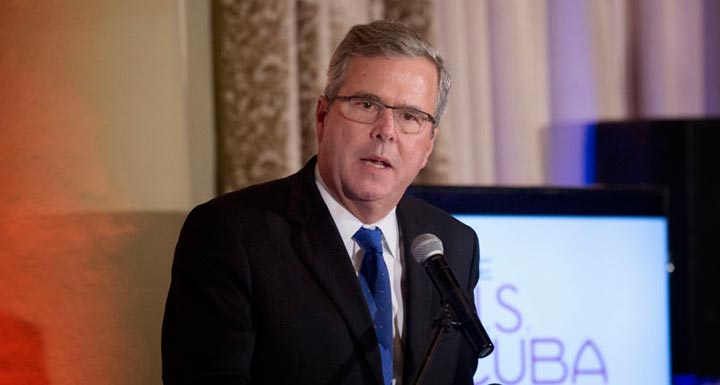
Today’s GOP is out of sync with Cuban Americans
“I probably have six Cuban grandmothers, and ten Cuban mothers,” joked then-Florida governor Jeb Bush at the Cuban Liberty Council’s annual dinner 10 years ago, where he was the guest of honor. “You can always count on me to do what I can to make sure that the cause of a free Cuba is front and center in Washington.”
This was in 2004, not long after the first millennials became eligible to vote. Back then, the “cause of a free Cuba,” as Bush described it, was clear to the Cuban American community: No lifting of the embargo. No normalizing of relations. No reconciliation.
Perhaps it shouldn’t be surprising, then, that after stepping back onto the political stage so many years later, Bush’s position on Cuba has changed not at all. “We’re not a step closer to freedom in Cuba because of the steps the president is taking,” he said last week. Nor should it be of note that Sen. Marco Rubio (R-Fla.), a Cuban American who grew up in the Florida Republican establishment during the 2000s, would declare soon after announcing his own campaign that he planned to “reverse every single one of the decisions [the president] has made” with regard to Cuba.
Nothing has changed, except for one thing: the Cuban American community itself. The political ground has shifted radically in the past decade, something neither Bush nor Rubio seem to have noticed.
As The Post recently reported, “Twenty years ago, 70 percent of Cuban Americans called themselves Republicans. In the latest Florida International University Cuba Poll, that number was down to 53 percent.” In fact, Florida exit polls in 2012 showed that Obama won the Cuban American vote, thanks largely to a 26-point landslide among voters under 45 — an incredible feat considering that nearly 80 percent of Cuban Americans in Florida voted for George W. Bush eight years earlier. Like the rest of American voters, it turns out that younger Cuban Americans are more liberal and Democratic than their elders, and their views on relations with Cuba are no exception.
Last June, months before Obama announced his plans, FIU’s poll showed that 52 percent of Cuban Americans living in Miami-Dade County opposed the embargo, including 62 percent of those 18 to 29 years old. In addition, 68 percent those surveyed last year favored restoring diplomatic relations with Cuba, fueled by an astounding 90 percent of young people. More recently, a nationwide poll by Bendixen & Amandi International found that a majority of Cuban Americans support Obama’s plan to normalize relations with Cuba, including 69 percent of 18-t0-29-year-olds; 60 percent of 30-to-49 year-olds, and even a 47 percent plurality of 50-to-64 year-olds. As for whether renewed ties will improve the lives of ordinary Cubans,the poll also found that 97 percent of the island’s residents believe that normalization will be good for Cuba.
This is the power of millennial foreign policy politics. By 2016, millennials will make up more than a third of the total electorate. And though Rubio might want to think of himself as a a “generational choice,” this new generation has already chosen. They want diplomatic engagement, not isolation. They want caution before intervention. They want the lessons that history has so clearly taught us about the limits of power to inform the way our presidents exercise it.
This millennial conviction will influence outcomes during the 2016 campaign, and perhaps no place more consequentially than Florida. While prevailing in the Sunshine State would certainly not guarantee an electoral-college victory for Republicans in 2016, the party’s path to the presidency becomes almost insurmountable without it. And, in a diverse swing state that President Obama won by less than a percentage point in 2012, the Cuban American voting bloc could prove to be the most important in the country. As New York Times polling analyst Nate Cohn wrote in December,“Cuban-Americans, in short, are the rare small demographic group that could easily decide a presidential election.”
All of this gives Hillary Clinton, Martin O’Malley and other potential Democratic candidates a clear opportunity. Not only can they portray their Republican rivals as stuck in a Cold War mind-set, they can show how disconnected Republicans are from the very voters they purport to represent.
Back in 2004, the New Yorker wrote that “Jeb Bush is largely responsible for the fact that most Miami Cubans are Republicans.” If most Miami Cubans turn out to be Democrats in 2016 — and if Republicans lose Florida as a result — Bush and Rubio could be a big part of the reason why.
(From: The Washington Post)

